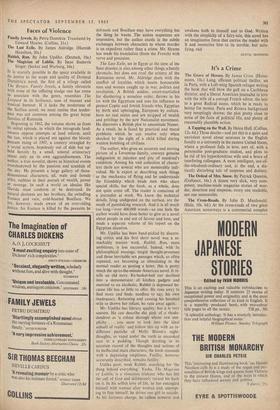Faces of Violence
Family Jewels. By Petru Dumitriu. Translated by Edward Hyams. (Collins, 21s.) IT is scarcely possible in the space available to do justice to the scope and quality of Domnul Dumitriu's novel, the first of a trilogy called The Boyars. Family Jewels, a family chronicle With none of the inflating stodge one has come to associate with the genre, resembles The Leopard in its brilliance, ease of manner and ironical humour. If it lacks the tenderness of the Sicilian novel, we must realise that tender- ness was not common among the great boyar families of Rumania.
Beginning in 1862, the volume shows us from its initial episode, in which the retrograde land- owners oppose attempts at land reform, until the last, which is played out against the bloody Peasant rising of 1907, a country strangled by a social system, hopelessly out of date but up- held fiercely by a small, amoral aristocracy intent only on its own aggrandisements. The author, a true novelist, shows us historical events overshadowed by the passions and scandals of the day. He presents a large gallery of three- dimensional characters, all, male and female alike, ruthless in their pursuit of wealth, power or revenge. In such a world an idealist like Day ida must conform or be destroyed. Its natural denizens are her brothers, the swindling Eustace and vain, cold-hearted Boniface. We are, however, made aware of an over-riding Justice, for Eustace is killed by the peasants he _ defrauds and Boniface may have everything but the thing he wants. The action sequences are impressive, but the author excels in the subtle exchanges between characters to whom murder is an expedient rather than a crime. Mr. Hyams has made his translation (from the French) with verve and precision.
The Last Exile, set in Egypt at the time of the Suez disaster, is also, among other things, a family chronicle, but does not rival the artistry of the Rumanian novel. Mr. Aldridge deals with the conflict of loyalties which besets honourable men and women caught up in war, politics and revolution. A British soldier, court-martialled for disobeying a senseless order, throws in his lot with the Egyptians and uses his influence to protect Coptic and Jewish friends who, Egyptian by birth and upbringing, European by culture, have no real status and are stripped of wealth and privilege by the new Nationalist movement. He discovers a British plot to assassinate Nasser. As a result, he is faced by practical and moral problems which he can resolve only when shocked by the sight of a child killed during wanton bombing of civilians.
The author, who gives an accurate and moving picture of a Levantine family, conveys genuine indignation at injustice and pity of mankind's condition. Among his vast collection of charac- ters there are several who are memorably indi- vidual. He is expert at describing such things as the mechanics of flying and he understands the friendship which binds men who share special skills, but the book, as a whole, does not quite come off. The reader is conscious of a journalist at work. We know the technical details, lying undigested on the surface, are the result of painstaking research. And it is all much too long—over 400,000 words—so one feels the author would have done better to give us a novel about people in and out of favour and love, and made a separate volume of his report on the Egyptian situation.
Mr. Updike has been hand-picked by discern- ing critics and his first short novel was a re- markably mature work. Rabbit, Run, more ambitious, is less successful. Indeed, with its philosophical musings, turgid thought-processes and those inevitable sex passages which, so often repeated, are becoming as stimulating to the normal reader as posting a letter, this is pretty much the up-to-the-minute American novel. It re- tells an old story. Ex-basket-ball star declined into a demonstrator of kitchen gadgets and married to an alcoholic, Rabbit is depressed be- cause life has so little to offer. He runs away to find more and finds, needless to say, his own inadequacy. Returning and causing his besotted wife to drown her infant, he runs away again.
Mr. Updike has literary quality, but it is very uneven. He can describe the pink of a rhodo- dendron as 'a colour through whose raw sim- plicity . . . you seem to look into the ideal subsoil of reality' and follow this up with an in- different pastiche of Molly Bloom's night- thoughts, as vapid under the teeth as uncooked suet in a pudding. Though dazzling in its accurate record of the thoughts and actions of its ineffecutal main characters, the book resounds with a depressing emptiness. Futility, however accurately described, remains futility.
Unlike poor, weak Rabbit, searching for 'the thing behind everything,' Yasha, The Magician of Lublin, is a vivacious trickster who has felt the call of God and deliberately turned his back on it. In his selfish love of life, he has entangled himself with woman after woman and, attempt- ing to free himself, he driVes one girl to suicide. As his fortunes change, he suffers remorse and awakens both to himself and to God. Written with the simplicity of a fairy-tale, this novel has an imaginative force that carries the reader with it and reconciles him to its terrible, but satis- fying, end.
OLIVIA MANNING


































 Previous page
Previous page